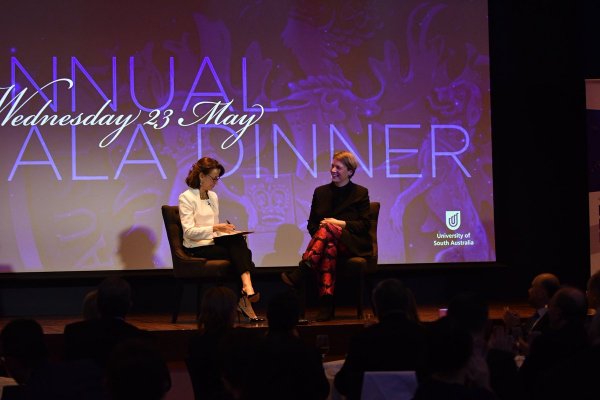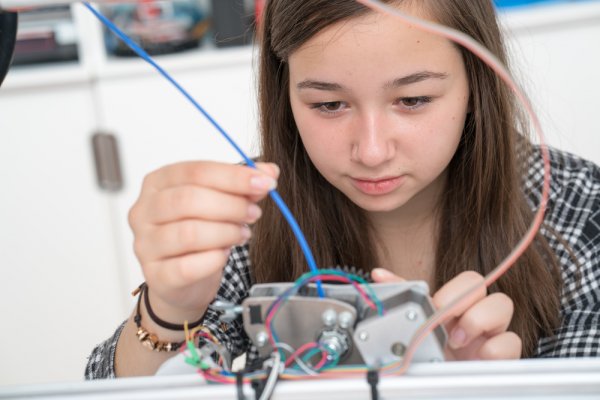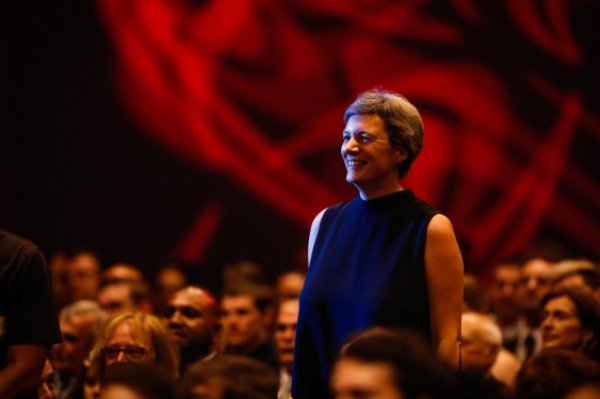HAUSSEGGER: This is an extraordinary privilege to me. First and foremost, Michelle, becoming Australian of the Year is something that of course none of us in the room know what that experience is like. How has it changed life for you?
SIMMONS: I remember on the night being absolutely terrified and overwhelmed, but then realising this tremendous responsibility that goes with it. I’ve been very honoured. And since it’s happened, I’ve met just a phenomenal range of different people across Australia. It’s made me more proud to be an Australian than ever. For me it’s a question of responsibility, of trying to do the right thing, trying to highlight the few causes that I believe in passionately, and trying to make sure that Australia does its best on the international stage.

HAUSSEGGER: Your work is obviously cutting edge. All eyes around the world are on you and your team. From what I understand, Australia has a two-three year lead in this area of developing a quantum computer and doing what you set out to do. Do you feel the winds of speed behind you or the winds of competition behind you? How do you manage that?
SIMMONS: Yeah, absolutely. It’s a global race. It’s a field that is changing every day. The way that the race is evolving is changing every day. Companies are coming up all over the world, but Australia is in a fantastic position. Through the Australian Research Council and the Centres of Excellence scheme, we have at least six Centres of Excellence in Australia that are based on quantum physics.
Australia is sitting in the lead position to create industries of the future here in the field of quantum science and technology. Now is the time to just push forward and make it happen
Australia is sitting in the lead position to create industries of the future here in the field of quantum science and technology. Now is the time to just push forward and make it happen. Even though we had a high international profile in quantum science and quantum computing, it’s got even higher, with other countries saying, “Oh, wow. They really appreciate their high-flying scientists there.” So being named Australian of the Year has helped us in the competitive race. It’s made people look at Australia and say, They really recognise and respect that area of research. We want to be there.”
HAUSSEGGER: What brought you to Australia?
SIMMONS: It was partly seeing a theoretical paper from a researcher called Bruce Kane, who asked if you could build a quantum computer in silicon, how would you do it? I was in the UK at the time, making quantum electronic devices, and finding that they were incredibly fragile and very frustrating because it was very difficult to make the same device twice. I remember looking at this idea from Bruce and thinking, “That’s the way. If you just go back to basics and try to make device reproducible, that’s the way I would do it.”
Another thing was the Centres of Excellence and the research fellowship schemes in Australia. Australia has had these schemes since 2000, and so we’ve had generations of scientists come through in highly collaborative, big teams, with the ability to lead at an early age, making us right at the forefront of many research areas.
My sense is that this has only grown over the last 15 years or so, so Australia has now got this incredibly strong foundational research base. The area where we struggle is when we try to translate that world-leading research into creating industries here. This is something that I’m absolutely passionate about – trying to understand why there is that barrier.

Virginia Haussegger, Dir 50/50 by 2030 Foundation and Prof Michelle Simmons
HAUSSEGGER: What is your hunch about that? Is it something to do with our inability to tell a good story, or is it about confidence? Is it a cultural thing?
SIMMONS: There is definitely a cultural element, which I guess surprises me because part of the reason I did come was because I liked the give-it-a-go attitude of Australians. I actually phrase it as “highly competitive” and “highly collaborative”. When it comes to translating, though, things change. It’s there where you’ve really got to believe in yourself.
That’s the thing I’ve been surprised at, is that Australians hold back. It’s completely different to our sporting culture where you see people really go for it. When it comes to translating, there’s a tendency to be risk averse, to believe you need big corporates from overseas to achieve. We then actually transition away from that highly collaborative environment to become internally competitive. Universities start to fight over the IP they have, rather than look forwards, and they don’t allow the creation of those industries to happen.
There’s a lack of people who are able to give their experience of failure as a good thing, not a bad thing
HAUSSEGGER: What do you think is behind that risk averse nature, though, or culture? I do a lot of work in the public sector, and it is a big issue there as well. Despite encouragement from the leadership for people to throw away the fear of failure, and to take risks – the truth is there’s a great fear.
SIMMONS: There is. I think there’s a huge amount of rhetoric about Australia creating industries here and not letting our IP drift overseas. But get behind it! Everyone talks about supporting it. Yet, actually, when it comes to it, it doesn’t happen often enough. Even within universities there’s a sense of not wanting to fail. There is a lack of people that have done it, and failed, and gone back over and done it again, again, and again. There’s a lack of people who are able to give their experience of failure as a good thing, not a bad thing.
We just can’t afford to hold back
In the quantum space, and I think in other areas, like plant biology, robotics, earth sciences and medical devices in Australia, we’re in a leading position. We just can’t afford to hold back. If we hold back now, then industries will take off internationally, and even though we’re right at the forefront, in some cases ahead, we will lose it again.
HAUSSEGGER: What do we need to not hold back? What’s required to make that push through?
SIMMONS: I hate saying we need new policies, or anything like that, it really comes down to breaking down the boundaries between university, academia, and industry and getting on with it. Creating schemes where you get those people working together, where there’s incentives so that if you set up a company, there’s some kind of incentivisation for the academics to do it. That’s definitely a silent mentality that we have to break down.
Importantly it’s about believing you can do it. There’s lots of things that Australia does just inherently naturally but doesn’t give itself credit for. It doesn’t realise that it is ahead. We should recognise this.

HAUSSEGGER: Let’s talk about science and girls. I was really surprised when I first heard you talk about the science curriculum in schools being feminised, and that that was wrong and somehow offensive. Can you explain that?
The attempt was genuinely intended to encourage girls, but you can’t really take the maths out of physics. It’s a disaster to do that
SIMMONS: Yeah. I think many years ago there was a genuine attempt to recognise that lots of girls were not taking physics and to try and fix this. People looked at why girls were not doing it, and they looked at the curricula. They realised that a lot of what was being taught was mathematical, and there was a view that generally girls didn’t like maths as much. So, they made more descriptive questions that might encourage more girls to come in.
The attempt was genuinely intended to encourage girls, but you can’t really take the maths out of physics. It’s a disaster to do that. It reduced the standard of the education that everyone was getting. I believe it is better to encourage young girls to get involved by enjoying the subjects directly.
HAUSSEGGER: Why are there so few women like yourself? Well, that’s obvious because you are exceptional, but why are there so few women in your particular area?
SIMMONS: This is something, again, I’ve tried to understand for many years. Talking to young girls and trying to figure out what point they leave ‘the hard subjects’ – and that’s maths physics and computer science. The thing that I’ve really learned is that from a very early age, the career advice they get is still coming primarily from their parents or from their career advisors.
It’s really the advice that they were getting generations ago. That advice is not changing. They look at what they could be, and they think, “Okay. I want to have a career and the opportunity to have children. How can I manage it? The medical profession have it all sorted out. The medical profession knows how to let you take a year off and come back in. But if I do science or engineering, I don’t really know what my career will be. It’s high risk. I don’t know if I’m going to be able to manage a family with that”.
Rather than choose one career and narrow down your life options from the beginning, pick up the skills you need going forward around the things you love, and new opportunities will open up
We need to encourage girls to see what careers you can have in those areas. Whether it’s being a coder for Atlassian, or an engineer for Qantas, or being a fighter pilot, or working in communications and satellites with Australia’s new space agency, or being a quantum computer scientist, or a quant in the bank. All these industries have careers that are very diverse, very exciting, but they require different skill sets.
There’s a huge wave in technology coming in high-tech areas where a lot of maths, statistics, and coding is going to come in. If you don’t take those, you’re going to miss out in this big transformation. I’m passionate about showing them there’s this whole world out there and not to miss out!
Rather than choose one career and narrow down your life options from the beginning, pick up the skills you need going forward, no matter what those skills are – around the things you love – and new opportunities will open up.

Professor Michelle Simmons after being named 2018 Australian of the Year in Canberra. Photo: Salty Dingo
HAUSSEGGER: It’s interesting when you talk about schools because going back to your own learning, I understand that you dropped physics in high school, and actually stuck with biology, and chemistry, and history. English literature. Why did you drop physics?
SIMMONS: I could only choose a certain number of subjects. I chose the subjects that were easy for me and gave up physics, and after about three months I thought, “What a disaster. I’ve made a big error.” I ended up taking it up outside of school.
I’ve always liked doing things that are really hard. At that time, I preferred biology. Then I realised that the challenge was not so great for me in biology, whereas I’d lost that challenge that I got from physics. I just realised straight away it was a mistake.
HAUSSEGGER: I read somewhere where you said that opportunity comes from hard work. That really resonated with me because successful women often use the word luck. They’ll say, “I’ve been lucky,” or “This happened because I was lucky.” which makes me a bit cranky because then I think, no, actually you work very hard. Do you believe in luck, or is it really just hard work?
I firmly believe you create your own opportunities. Hard work creates the opportunity in the first place.
SIMMONS: With all my students, I tell them it’s just grit, determination. You’ve just got to get in there, and work hard, and opportunities will happen. I think, at the same time I do believe there’s an element of luck that good things happen. For me, coming to Australia was lucky. I could have chosen to go somewhere else. I came here. It worked out very well.
I firmly believe you create your own opportunities. Hard work creates the opportunity in the first place. The more you work hard, the more things will open up. I also think taking opportunities when they come is very important. My view has always been, “Do as much as I’m physically capable of and see what happens.”




